sshrivastava - Soft Water DW Etching question
Hi sshrivastava,
I just read something you wrote in another post about hot or cold water DW hook-up.
You said that it is a no-no to connect a DW to whole-house softened water => "no end of trouble w/etching, etc."
Where I live we have very hard water, and therefore have a Culligan water softener. We also currently have a Bosch DW (the one top rated by CR 2 years ago) and I don't have a single glass that has survived the DW without a disgusting cloudiness!
I am planning a major renovation in a house we bought and hope to move into in Feb. This house will have a water softener installed. I need to order 2 DW for my new large kitchen. I was set on buying 2 Bosch, hoping the slightly less hard water in our new town will save our glasses (14 grains instead of 16). I was going to buy Bosch b/c my DH said "There is NO WAY the cloudiness is caused by the DW, and any plumber would say it is b/c of the water - period!" I'm driving myself absolutely bonkers researching DW, and go back and forth about what is causing my cloudiness. I'd really like to not think about my DW and just end up with glasses that are pleasant to drink out of and not be embarrassed to serve someone a glass of water!
It SEEMS like using Glass Magic helps the cloudiness and almost makes it go away on some glasses, although never completely. I have soaked my glasses in a wash basin FULL of vinegar and it doesn't do a thing to remove the cloudiness. I only use a tablespoon of DW detergent (Trader Joe's brand, has enzymes.) and I always use Jet Dry and use Glass Magic every time unless the stores run out.
I've read tonight that soft water that is heated very high in the DW can cause etching, so now I'm thinking the reason I have etching is that the Bosch uses condensate drying, which as I understand it, means the rinse water is super-heated to cause rapid evaporation of the water when the door is opened.
I did a Google search using "Bosch Dishwasher cloudy glasses" and got many hits where people were gripping about their cloudy glasses w/the Bosch. I did the same search substituting Miele for Bosch and only got hits saying how great the Miele was because of the salts that help with HARD WATER, which supposedly causes the cloudiness!
So, before I lose my mind, and in the interest of buying 2 DW that will clean my glasses without a care:
* Do I try to connect un-softened water to my DW, buy Miele's, and use the DW salts to combat the hard water?
* Do I connect the DW to the house softened water and not use Miele salts since water is already soft?
* Do I be sure to connect using cold water and use the China care setting to wash glasses?
* Could it be the detergent? Should I try Cascade Complete in my current Bosch?
Comments (44)
nwesterner
16 years agoI am not sshrivastava, but have had the same problem. My DW is an Asko that I have had 3 years. Prior to that, I had a working DW for maybe a year out of 35plus years of married life. We have been here for over 30 years and had a whole house softener during all that time. In washing by hand, I had no problem with etching of glass, washed in as hot a water as my hands could stand, and rinsed in hot.
My DW is closer to the bottom end and not really sure how hot the water gets. It also has fan drying. I used Cascade Complete, the Walmart one similar to it, and Electrsol tabs. Finally, I bought some Ecover tabs---they all have enzymes.
I believe the etching is probably caused by the softened water and heat(not sure about phosphates?). Will be interesting to find out (when I decide to replace glasses) if the Ecover makes any difference. Probably not, and the only answer for me would be to wash them by hand. I won't disconnect the softener and don't think my DW is supposed to be hooked to only cold water.
Of course, it's the clear glass that is the worse, and on one set that I really like, think maybe I should have just washed by hand. Too late now!
Related Professionals
Corcoran Kitchen & Bathroom Designers · Roselle Kitchen & Bathroom Designers · St. Louis Kitchen & Bathroom Designers · Saint Charles Kitchen & Bathroom Designers · Albuquerque Kitchen & Bathroom Remodelers · Elk Grove Kitchen & Bathroom Remodelers · Fair Oaks Kitchen & Bathroom Remodelers · Linton Hall Kitchen & Bathroom Remodelers · Mesquite Kitchen & Bathroom Remodelers · South Park Township Kitchen & Bathroom Remodelers · Southampton Kitchen & Bathroom Remodelers · Vashon Kitchen & Bathroom Remodelers · South Jordan Kitchen & Bathroom Remodelers · Alafaya Cabinets & Cabinetry · Land O Lakes Cabinets & Cabinetrynwesterner
16 years agosparky,
Guess what I don't understand is why the whole house softener (with salt) can add to the etching, but un(whole house)softened water with salt added per Miele wouldn't cause etching. Both are salt-softened water plus heat, so what is the variable? Is it the rinse water with the whole house softener that causes the problem? Is there salt in the Miele rinse water? Not sure what I'm missing in trying to understand etching. And, btw, I do not rinse my glassware or dishes.
dadoes
16 years agoI don't think water can be softened any further than to 0 grains. If one has a whole-house softener, and a dishwasher with as softener, the dishwasher's softener should ideally be disabled as it won't have any effect other than to make the water salty rather than more softened. Newer dishwashers (Miele?) with softeners have sensors to control the softening effect, so theoretically the softener in such a machine should automatically disable itself. Other units with softeners that are set manually for softening level would have to be disabled manually (or left empty of salt).
As has been said, soft water in and of itself shouldn't cause etching. It's caused by the combination of too much detergent or too little soil for the detergent to act upon (due to unneeded prerinsing), with softened water and high heat.
The best way to avoid etching, no matter what is the hardness/softness of the water, is to use the MINIMAL amount of detergent that will do the job.
User
16 years agoSoft water is soft water, whether from a whole-house softener or from a softener in your dishwasher. Long cycles and high heat cause etching, when combined with the high alkalinity of the detergent. You could wash your glasses separately on a light cycle or always choose the lightest cycle you can. There are detergents designed to help prevent etching as well.
jobird
16 years agoHi Smarge,
I read about your problem and looked on the Bosch website for possible help.Here are some things they recommend for the 800 series DW:
"Do not pre-wash items having loosely-attached soiling. Remove large food particles, bones, seeds,
toothpicks, and excessive grease. Items having burned-on, baked-on or starchy soils may require
pre-treatment.""For best results, use fresh
powdered dishwashing detergent.""This dishwasher uses less water so you need to use less detergent. With soft water, 1
tablespoon (15ml) of detergent will clean most loads. The detergent dispenser cup has
lines that measure detergent to 1 tablespoon (15ml) and 1.75 tablespoons (25ml). 3
tablespoons (45ml) of detergent will completely fill the detergent dispenser cup.""ATTENTION
To avoid dishware damage, do not use too much detergent if your water supply is
soft. Using too much detergent in soft water may cause etching in glassware.""NOTE: If you do not know the hardness of your water supply, use 15ml of detergent.
Increase the amount of detergent, if necessary, to the least amount required to get your
dishware and kitchenware clean.""To achieve proper drying, always use a liquid rinse agent, even if your detergent contains
a rinse agent or drying additive."Others have said the same things,in the above posts. The recommended 1 Tablespoon/15ml is not very much detergent.
Hope this helps.
Here is a link that might be useful: Bosch 800 series product manual - pdf format
rococogurl
16 years agoI don't know about the Bosch. I have a Miele Incognito 858 (3 y.o.) with a whole house softener and 0 degrees hardness.
I also have some etched glasses, especially those used with milk products.
Miele helped me program the machine to disable the softener. They also had to raise the rinse temperature to get my dishes to dry properly.
So I have all the conditions. When glasses are etched, nothing will remove the cloudiness. Otherwise, vinegar should remove filming.
I tried the Miele tables and use half for most loads. Haven't noticed additional etching since I switched detergents.
There doesn't seem to be a fix for etching except to increase the water hardness somewhat but no one has been able to tell me what it should be increased to.
Also, considering that we're on super hard well water, which had previously ruined every plumbing fixture in the house without the softener, I'm more inclined to buy new glasses than to deal with the scale.
eandhl
16 years agoI am with jobird on this. European DW's use much less water thus less detergent. I always thought etched glass came from to much detergent.
villandry
16 years agoSmarge - 14 grains of hardness is still very hard. Most detergents are formulated for 5 grains of hardness..so I've heard. You will still want to have soft water for your dishwasher because that is what really gets things clean. Sorry, but your glasses will suffer. When they become really etched(frosted) you could just tell people they are Lalique.
sparky823
16 years agoWhat I was saying was that with the whole house unit set for say 0 grains,you are getting etching.
If with the new Miele you manually set it for say 5 grains would 5 grains not be better than 0 grains? This is starting with unsoft water and going to 5 grains would you not have less etching since the detergent would have some minerals/hardness to deal with?? I am sure the Miele automatically calculates what hardness/salt/softness but I used the manual adjustment for an example.
villandry
16 years agoSparky,
You will have less etching. But, whether your water is soft or hard your glasses are going to become etched. The only difference is the rate at which it happens. With the mainstreaming of european-style machines that heat water(to high temperatures), have very long wash cycles, and use minimal amounts of water manufacturers responded by coming out with Shine Shield. Which by the way, reduces etching, it does not eliminate it(and is disgusting because it leaves a film on everything. There is no way around it unless they change their formulations or you do everything in cold water. Thats why there is a 115 degree crystal setting but that will not clean anything else.
peggross1
Original Author16 years agoOK. So is my answer to buy 2 Kitchenaid DW to avoid the long wash/low water/ultra hot temp. issues?
villandry
16 years agoI don't know about Kitchenaid but if you going to buy two dishwashers you could always use one for just glassware and the other for everything else. That way you could run an entire load on a very cool setting.
villandry
16 years agoThere you go...get two Mieles. Then you could run an entire load of glasses on the Crystal Setting. That should minimize your etching problem.
jerrod6
16 years agoI just checked some documentation about Miele cycles. Some of the models have something they call "a sensor controlled glass care system." I think this is nothing more than the machine controlling the wash temperature to keep it low while still being able to clean everything.
For the cycles that use this glass care system some of them are using water in a range of 98-118F. Other glass care cycles are in the range of 113F to 115F.
The standard sensor cycle uses a temp range between 113F and 150F so it is not rated as "glass care", but if the dishes aren't dirty you are going to get a low temp wash.
sshrivastava
16 years agoSorry I'm late to this thread, considering it has my name on it! LOL...
Here is my understanding of etching: it is a function of water hardness, heat, and detergency. Under normal conditions, all water has some degree of hardness that is sequestered by the detergent. When you use a whole house softener, all the calcium carbonate in your water is transformed to sodium carbonate (washing soda). Depending on how hard your water was to begin with, softening water boosts its alkalinity and the absence of any hardness causes detergents to be much more aggressive. If you boost the temperature of the water, the detergent becomes even more aggressive and the phosphates react with the silica in the glass (etching).
If you're going to supply your DW with softened water (0 hardness), I would recommend using a non-phosphated detergent and in a low dosage to start with. If you're going to supply your DW with unsoftened water, I would use a DW with a built-in softener, such as Miele, that can soften the water itself.
Supplying your DW with softened water is not the same as utilizing a DW with a water softener and supplying it with unsoftened water. A Miele DW w/ softener measures the hardness of incoming water and softens ONLY AS MUCH AS IT NEEDS to achieve a total water hardness inside the dishwasher of approximately 4°dH. When you supply the DW with softened water, all of the water is at 0°dH which is too soft. Feed the DW hard water and let it decide how much to soften it -- that's what all the fancy gadgetry is for! :)
I've had my Miele La Perla for over a year now, and I don't have a single etched glass. I feed it hard water (about 30-40°dH) and the DW reduces that down to the optimal level for dish care. FYI the hardness sensor in the Miele cannot properly detect softened water, and so it will read as if the water was not softened. This is why you have to turn off the softener otherwise it will continue softening water that was already softened before entering the DW.
villandry
16 years agoWow! Not a single etched glass. That's quite an endorsement.
So to sum up yet another addition of "Why Are My Glasses Etched?"
A. Buy a Miele La Perla($2,000) and hook it up to a hard water source.
B. Use only Phosphate-free detergent, which we know doesn't work.
C. Do all your expensive crystal by hand which is not energy and water friendly.
D. Or, drink straight out the bottle, completely bypassing the need for a glass.
cheers!
mando_p
16 years agoanother side effect.
i was thinking about feeding my excella hard water as well, bypassing our whole-house water softener.
however, i would still like our dw to have a hot water feed as to not extend the cleaning process. guess what?
almost ALL homes with pipes that are re-configured to support whole house water softener feed soften water into the water heater to avoid the mineral build up that the water softener is suppose to avoid.
so, the excella will need to be fed cold water or install a flash/on-demand water heater (which is also fed hard water and will suffer, over time, the mineral build up) AND a new pipe installed that supplies non-soften water.
arrrggghhh :\
peggross1
Original Author16 years agoThank you,sshrivastava, and everyone else, for sharing your knowledge and advice!
Please let me know if my conclusions below are correct regarding my new house:
* I should buy 2 Miele Excella DW ($$$!) and have them installed using UNSOFTENED, COLD water.
* I should plan to use the salts in the Miele's built-in softener.
* If it turns out that I am NOT reasonably able to supply unsoftened water to my Miele's, I should still connect the cold water and disable the Miele's water softener.
* I will continue to use the Phosphate-free Trader Joe's Dish Detergent I've been using.
* I should use one of the "glass care system" settings when I am washing glasses (almost every load, I'm sure).
And even so, I will one day have etching on my glassware again, but it won't happen nearly as quickly.
________________________For now, in my current house w/the Bosch, I understand the following:
* I should toss my disgusting, cloudy glasses and buy new ones, in the hope that I now will be less likely to etch them.
* I should continue to use the Trader Joe's detergent, maybe even less than 1 Tablespoon.
* I am wasting money using Glass Magic since it won't remove my etching, even though I thought it reduced it somewhat.
* I should continue to use Jet Dry rinse aid.
* I should use a Crystal setting with glassware, which presumably won't heat the rinse water as much or run as long a cycle.
Should that do the trick?
jerrod6
16 years agoIf you buy an Excella or Laperla the China/Crystal cycle will use water between 98F and 118F and the economy cycle will use water between 113F and 115F. There is also a short cycle that uses water of 104F but does not do a dry period.
I have used the economy cycle(this is also a sensor cycle that will modify the program..add an extra rinse for dirty dishes..etc) with a full load of everyday dirty dishes and glasses and the dishwasher is able to clean the load with this low temperature just fine.
The Optima also has the China/Crystal cycle and short cycle and it also comes with a water softener.
peggross1
Original Author16 years agoThanks Jerrod6. I'm ordering two Excella DW, so your tips will be very useful.
Today I told my GC that I want the two DW, as well as my filtered instant hot/cold faucet AND my filtered SZ fridge's icemaker all connected BEFORE my water softener. Everything else in the house is to get the softened water. (Oh, and did I mention that I have a monster whole house water filter that has to be installed before the softener too?
He looked at me like I was from outer space and asked why on earth I'd want unconditioned water going to my DW's. I said, "You don't really want to know, do you?" He thought for a second and said "Nope."
Just another crazy homeowner!
nwesterner
16 years agovillandry,
"B. Use only Phosphate-free detergent, which we know doesn't work."
My state is in the process of banning all phosphates in dish detergents over the next few years. I had some badly etched glassware and decided to try an enzyme based, but non-phosphate, detergent, Ecover Tabs. I had previously used Cascase Complete, Walmart, and Electrosol tabs. The Ecover seems to clean even better than the others and I have now started to cut the tabs in half and see no difference. I had some problems with my stainless cookware at times, but since using the Ecover, they also get cleaned with no residue.
The Ecover is more expensive, but if cut in half not by much. It also doesn't smell as badly as most detergents which are a real negative to me. So, non-phosphates do work. And my DIL has used non- phosphated ones, inexpensive at that, for a household with lots of kids and sees no difference either.
villandry
16 years ago@Nwesterner - I have tried Ecover Tablets at least 3 times and I find them unacceptable. The real cause of phosphate contamination in waterways(causing an algae-bloom) is non point source contamination, i.e. agricultural runoff. The abuse of fertilizers in the ag industry is epic and it will be very expensive to control because of decades of farmland mismanagement. This is a classic example of throwing the baby out with the bathwater. Phosphates will be very difficult to replace in automatic dishwashing detergent because they are inexpensive and perform beautifully. The technology is there to replace them its just a matter of cost and maybe a change in the dishwasher itself. Phosphates were used extensively in laundry detergent and basically performed miracles. Now you have to use Shout, Spray-n-wash, OxyClean or a Miele washer w/ Persil to get your clothes clean. There is always a trade off.
nwesterner
16 years agovillandry,
I agree with your assessment re:phosphates but, sadly, the dw users of this state are being made to look like the villains.
Interesting about the Ecover tabs. I do have a whole house sofener, but they have worked for months now better than any of the other detergents I tried. In fact, I just started to halve them and the load I ran tonight (3 days since last load washed) is absolutely clean--no pre-rinsing or anything. I have an Asko and have been pleased with how well it cleans, and will stick with the Ecover tabs it seems considering the direction the state has declared we are going re:dw detergents.
villandry
16 years agoNWest - I wonder if an Asko dishwasher gets hotter than a Miele on a Normal/Normal Plus cycle. Believe me, I would love to use a non-phosphated detergent but, I have been disappointed in the past. An increase in the temperature might compensate for the lack of phosphates but I really don't want to run a Sani Cycle everytime. It is long enough as it is but, could be a solution to the etching problem.
jerrod6
16 years agoThe Miele Dw I purchased in 1996(G885SC) had the selector dial that you used to select a program. It had Normal 130F and Normal 150F programs.
The next few model years had a push botton next to each program name and it had normal and normal plus buttons, so I think maybe Normal would be 130F and Normal Plus is 150F.
jerrod6
16 years agoIt seems that etching has become a problem since there are so many products that now claim to reduce it. I don't remember even hearing about it until these past two years.
Many products are no longer constructed as well as they used to be. I wonder how much etching is the result of glass manufacturers not making glasses as good as they once did?
villandry
16 years agoOh! its been around. I grew up in a rural area with extremely hard water. Everyone, did the double-cup-fill. Hell, Cascade was on my mothers grocery list every week!! In the past, everyone would say it was due to the powder scratching or it was hard water. Some people even said it was due to the rinse aid. Well, I took some of my glasses to work and placed them in a bath of hydrochloric acid and of course the "film" was still there.
Well now we know.
I am just going to stay around here for a little while longer...something will change :)
cheers.
peggross1
Original Author16 years agoFWIW, I just spoke to Miele rep. who put me on hold and confirmed with a technician (who by chance, used to work for a water softener company!) the connection I plan on doing. He said yes, our plumber should run cold, unsoftened water to my DW's and use the Miele salts to reduce the hardness to the correct degree.
User
16 years agoOf course Miele would tell you that. They are quite happy to have your repeated business in the form of salt sales. Perhaps it's just my skeptical nature, but the manual doesn't say how soft it makes the water, or explain at all how that softening is accomplished, just that it uses salts to achieve the correct softness. Pretty low on detail. If it works for you, great, but I also have no etching with my softened water feeding my dish washer after 3 years of my old dish washer and 18 months with my new one.
3katz4me
16 years agoWell, I'm glad to know I'm not the only one with this problem. I guess I'll have to get the Miele tablets and try those. Nothing else has worked. Tried phosphate free 7th Gen and while I think the etching was better, none of my coffee cups got clean - white cups, dark insides - yuck. Tried lower temps - okay for glasses but nothing else gets clean.
I find it absolutely astounding that the $500 Maytag dishwasher I used in the same house with the same water got my dishes clean and never etched a single glass in ten years of use (and still doing a fine job at my lake cabin). And the $1600 Miele Incognito routinely destroys my glassware. No need for all those cycles - can't use most of them because they're "too hot" for glassware and I have glasses in every load.
jerrod6
16 years agoMy older Miele DW had Sequence lights to indicate what phase of the program it was in. The first light was Softener. The DW would only do this step once in a while, where it would draw a bit of water, then sit, draw more, then sit, draw more then sit, then it would drain, then start the prewash. This took about 3 or 4 minutes. The frequency of this operation would increase if you set the water softener to work on harder water. The manaul described this as water softener regeneration.
My new model has the softener that adjusts itself to the hardness but it does something similar but there is no indication of it, you have to watch for it. It will start the drain pump and while it is running, a bit of water will come in then stop, then a bit of water, then stop. All of this is done while the drain pump is running and the display says PREWASH like it normally would. It doesn't take 3 or 4 minutes only 1 or 2.
The manual says that the water should be softened if your tap water hardness is over 8 gr/gal otherwise not to fill the softener with salt,so I would think that they are aiming for something under this amount.
There is was also a technical paper that mentioned that the water softener is consumption linked and so will regenerate based on that, and that the softener exchanges sodium ions for calcium and magnesium. The regeneration step is done to refresh the resin. I am no chemist or engineer just reporting what the info is saying.
I also read something from Miele ( of course I don't remember where I read it) where they described the softener as proportional or something like that. Anyway I think what they were saying was that it doesn't soften all of the water on the way in. It detects the hardness and only softens some of it for each fill.
I could also be nuts but I think that is what I read.
I use the salt sold my local appliance store. They sell Somat DW salt and it works OK in my DW. One box lasts over a year so you can look for that if you can find it cheaper than what Miele sells.
sshrivastava
16 years ago* Posted by aliceinwonderland_id (My Page) on
Mon, Oct 29, 07 at 12:10Of course Miele would tell you that. They are quite happy to have your repeated business in the form of salt sales. Perhaps it's just my skeptical nature, but the manual doesn't say how soft it makes the water, or explain at all how that softening is accomplished, just that it uses salts to achieve the correct softness. Pretty low on detail. If it works for you, great, but I also have no etching with my softened water feeding my dish washer after 3 years of my old dish washer and 18 months with my new one.
Miele has a lot of information in the form of technical bulletins and other goodies that they can send you via email. One of their customer service reps sent me info on etching. Miele dishwashers with built-in softeners mix softened and unsoftened water in the proper proportions to achieve a hardness of 4ðdH inside the dishwasher. According to Miele this is the ideal hardness for washing dishes and minimizing etching.
Gibby, if you use the unheated cycle on your Miele you will likely minimize etching. The reason you may be getting more etching with the Miele vs. your old unit is because the Miele utilizes the heater in the majority of cycles. Detergent + softened water (zero hardness) + heat makes for etched glasses. Try washing using an unheated cycle.
My plumber looked at me funny too when I told him I wanted cold, unsoftened water run to the dishwasher -- but after I explained everything to him, he just shook his head, smiled, and muttered something about "all that damn technology" lol!
patsyann
16 years agoI hate to say this, but my 50 years experience says that any and every dishwasher, whether soft water or not, cold water or hot "WILL ETCH GLASS". I finally decided if I wanted my glassware with no etching (and the cheaper the glasseware, the quicker it etches) I wash it by hand. My glasses have been etch-free( 2 years ).
jerrod6
16 years ago"(and the cheaper the glassware, the quicker it etches)"
Patsyann this is something I am wondering about. I commented earlier that it seems like we are having a sea of etching and numerous products available to help with it. I am wondering if it has to do with how the glasses are made, so maybe we are buying a bunch of cheaply made glassware even though we may be paying more for it today than we did years ago.
looser
16 years agoI don't think it doesn't matter if you use the Miele salt or salt made by another manufacturer. That salt is just plain sodium chloride, basically the same salt you use for seasoning meals.
The salt itself doesn't soften the water. It is used to regenerate the ion exchange resin (just like jerrod6 mentioned above).I had to run many regeneration cycles in commercial (laboratory) style DWs. They don't do the regeneration process during a normal cycle. There is a specific cycle just for regenerating the water softener and one had to add a whole bunch (around a full one liter bottle) of salt. The water was very hard, so we had to do it probably once a week. A little light indicated that the softener needed to be regenerated...
sshrivastava
16 years agoYou can use whatever salt you wish, but it has to be of a certain grain size so as not to gunk up and also must be of a high purity. "Solar" salts and the salts typically used in your whole house softener should not be used, as they are not of the required purity.
rolls_rapide
16 years agoIn Europe, the older and/or cheaper machines indiscriminately soften all water for main wash, intermediate rinses and final rinse. This has the same effect as a whole house water softener feeding a dishwasher without its own softner unit.
The modern European machines have built in intelligence, and will only soften the water if it gets too hard. They also have a mixing function during the rinse phase, whereby the soft water is mixed with unsoftened hard water, to allow a certain degree of protection to the glassware.
Hot water will damage glassware, as will intensive spray action.
I've noticed that my Bosch sprays normally in the upper basket until the final rinse, then it seems to reduce the spray pressure as the rinse aid is added. It gets really lethargic as the machine attains the final temperature, just before the drying phase begins.
So my guess is that it is programmed to protect glassware as much as possible.
3katz4me
16 years agosshrivastava - yes, I've learned that lower temp cycles might not ruin my glassware - unfortunately they also don't get much of anything else in the dishwasher clean. Maybe I need to go back to the same practice I used with my cheap Maytag - rinse all the non-glassware first so it will get clean on a low temperature cycle that won't destroy the glassware - even though Miele says don't rinse anything. Again, no need for all these cycles or a dishwasher this expensive to accomplish that.
juliettls
6 years agoThe etching is caused by using too much detergent. Softened water needs far less detergent than hard water.


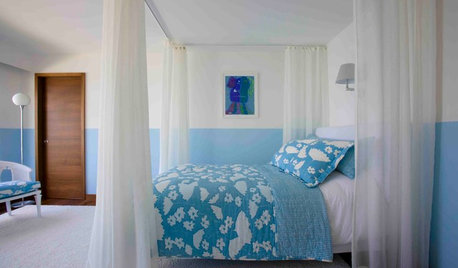
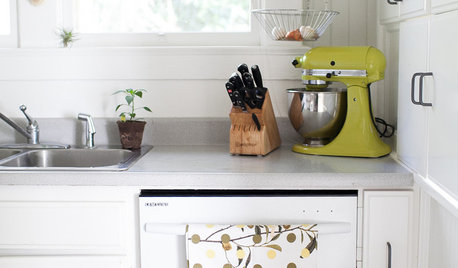
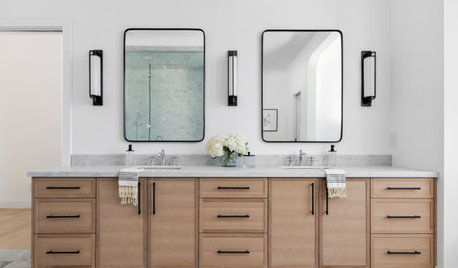
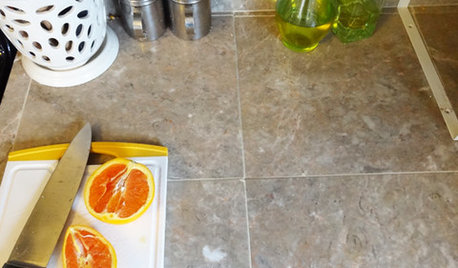
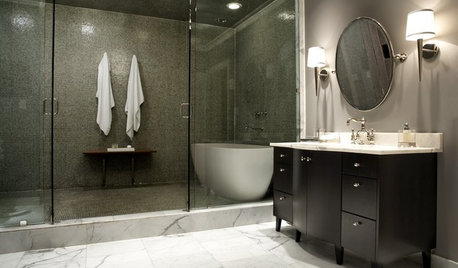
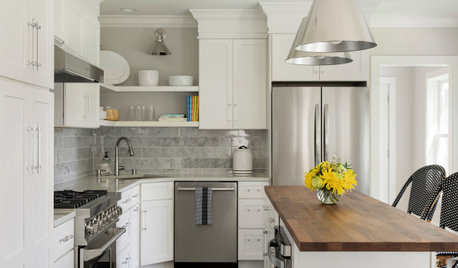
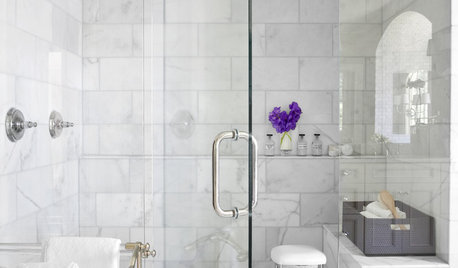
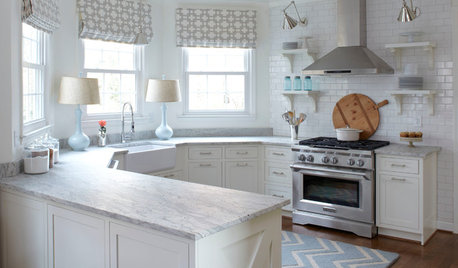







sparky823